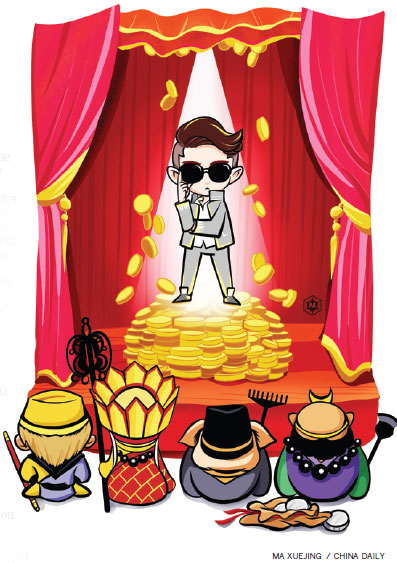
Yang Jie, director of the TV series Journey to the West, passed away on April 15 at the age of 88 years, triggering nostalgia, especially among those born in the 1970s and 1980s. Yang's series was adapted from Wu Cheng'en's novel of the same name. Written in the 16th century, the Chinese classic chronicles the legendary pilgrimage of a Buddhist monk, Tang Sanzan, and his four disciples: a monkey (Sun Wukong), also known as the Monkey King, a pig (Zhu Bajie), a former court official (Sha Wujing) and a dragon prince (Bailong) who can transform into a horse.
Yang's adaptation of the historical fantasy was probably the most viewed TV series in China. But its success should also be credited to the appeal of the Chinese classic itself. Like the Odyssey, Journey to the West is a hero's quest, which teaches us about life in a way that is accessible and entertaining. We have not got enough mileage out of the novel considering its cultural heritage. May be one day someone will write a story based on the plot of Journey to the West.
Just like European psychologists found inspiration from stories of Oedipus and Hamlet, Chinese scholars can still Journey to the West as a prototype for various social studies, including the study of group dynamics and personality types.
As a familiar story for the average Chinese, Journey to the West can still inspire theories through some of its plots, structures and characters. For instance, consider the fight between the real Monkey King and the fake one. Isn't it a brilliant dramatization of our dilemmas? Think of the Monkey King's attempted escape from a palm of the Buddha. That should make us ponder about the difference in the power of ordinary people and the authorities, and the omnipresence we associate with higher beings. And the monsters that create troubles during the pilgrimage represent the various human struggles we face.
Yang's series may seem primitive judging by today's standards of TV productions, which rely heavily on celebrities, special effects and marketing gimmicks. I do not deny the benefits of technological progress, but I admire Yang for pursuing artistic excellence against all logistical odds. The actors she selected had real talent and were capable of real feats. Among them, Liu Xiao Ling Tong (who played the role of the Monkey King) had undergone years of martial arts training in the Peking Opera tradition. Those were the times of the "real deal".
The story behind the drama was much like the struggles that Tang Sanzan and his disciples go through in their pilgrimage. In the 1980s, China was transitioning into a market economy, so while the episodes were being made, some actors, lured by more lucrative work, left the series.
We learn from Yang's memoir that she did not always have the support she needed from her danwei (organization). But she persisted. Over six years she produced a series that transformed all the actors and actresses into instant celebrities. Yang deserves our respect for her devotion to her art. Often, this kind of recognition comes posthumously. Few people knew Yang while she was alive. Upon her death, the public has suddenly discovered her. This does not feel right.
Yang's 1986 adaptation focused more on telling the story and showcasing the characters, instead of giving us a lot of eye candies. Looking at all the characters, we think about choices we make in life, and people we have to deal with in our journeys. That is the kind of connection an artist can create. The novel, as well as the TV adaptation, shows us the weaknesses we all may have, including our caprice, sloth and disobedience, as well as our strengths such as our devotion, playfulness, fraternity and focus on a mission. We like the story because it taps into humanity. It is about us.
The classic is a unique Chinese story with the potential of ever-expanding reach. If the story of Mulan can appeal to people across the world, Journey to the West, with all its fantasies, should be ten times more interesting. As the world gets to know China better, hopefully Journey to the West will start its own journey to the West.
The author is an instructional designer, literary translator and columnist writing on cross-cultural issues.
